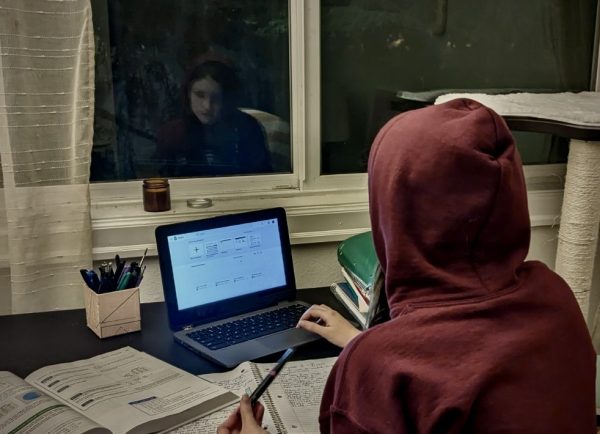
A student studies past dark to get work in. Many students have to do homework in the evenings after extracurriculars or work, meaning they’re up quite late. Photo by Lenore Myers
As the new school year begins, students are forced to recall one of the most difficult and crucial things we learn: the art of balance. With only 24 hours in a day, students must find a way to fit homework, extracurriculars, and even the time spent at school into a schedule that already demands time for socializing, family, eating, and sleeping. Often the simple act of taking time for oneself gets lost amidst the long to-do lists high schoolers keep. If not that, another integral part of our lives gets sacrificed — whether it be schoolwork, time with friends, or even sleep. It may be an impossible task to maintain a perfect balance, but that doesn’t mean there aren’t ways to help prioritize the things you value most while staying grounded.
Establishing boundaries is crucial, whether it’s between homework and hanging out with friends, extracurriculars and time with your loved ones, or personal time and sleep. Perhaps this means setting aside Wednesday afternoon every week as a designated study time or saying Sundays are days to stay home relaxing and connecting with your family. This doesn’t mean that you should turn down every opportunity that falls on a Wednesday or Sunday. Instead, if you consider the opportunity and stick to the schedule, most of the time, additional studying or using personal time might not be needed as you have found a good balance.
Finding faith in yourself and your ability to prioritize improves with practice. Unfortunately, teenagers without fully developed prefrontal cortexes aren’t great at deciding if something is important enough to push aside other things for. This is why it’s crucial to have rules or boundaries in place and think twice before breaking them. Instead of stressing about something you’re pushing back, only change your schedule if you are confident in the decision and know you are able to balance your tasks before adding something to your plate.
Typically, school workloads increase with each grade level, and the shift is a struggle. Homework is often necessary to pass your classes, but procrastination is real. When studying at home, there are ways to help yourself be more productive. Choosing a study spot that isn’t your bed is helpful. Sitting at a table, desk, or just in a different room free from distractions can help you concentrate. Be realistic — if you don’t like desks, simply sitting on your bedroom floor can help increase focus on studying if it’s the only thing you do at that spot.
Once you have a place, set a time to study. For many, studying as soon as they get home from school is the most successful, but that doesn’t mean it’s the only good way. Taking a break after school to decompress can be very beneficial. In fact, Franklin’s librarian Ayn Frazee highly recommends pausing in the middle of studying to take time for yourself, mentioning, “Breaks aren’t wasted time; they are a tool to help refresh your focus and boost energy. Stepping away benefits your body and brain — your work will still be there when you get back!”
Avoiding distractions is very difficult, especially with the constant allure of phones. Franklin senior Athan Sircy recommends the app, Opal. He downloaded it to help him stay off his phone during class, but now uses it even in the summer to cut down on screen time as “it blocks any apps you choose.” Opal also allows breaks where it pauses its block on your apps but makes you stay for 15-60 seconds on a waiting screen. This allows you to think things through before clicking the break button. Sircy states, “It’s very helpful for when you’re doing homework … and just staying off your phone in general when you have something to do.”
Taking time to get what you can done during school is also a great way to maintain balance — you’re already there, you might as well commit and cut down on homework time later. Even if you don’t have a study hall, spending tutorial in the library instead of going home is a great way to get your homework done during the school day. To make things fun, bring some friends and encourage each other while enjoying the company. If you have any tests coming up, Frazee can point you in the right direction. “We have several shelves full of AP practice tests, SAT and ACT study guides, college essay prep books, and more.” She encourages students to attend both SUN tutoring and tutorial in the library to stay caught up in classes.
Ultimately, there are lots of resources available to help prioritize schoolwork, but at the end of the day, should that be the priority? Socializing with friends and family, as well as taking time for yourself to do something like listening to music, pursuing a hobby, or even watching TV are all important to your well-being. As Frazee puts it, “If you have to find the time for yourself you never will; you have to make time for it. School is important, but nothing is more important than your mental health.” If you aren’t taking care of yourself, you’ll burn out. Burnout is an actual medical diagnosis, which is much harder to recover from than a grade markdown on one assignment. Maintaining a high school workload is difficult; remember that you don’t have to be perfect.


































